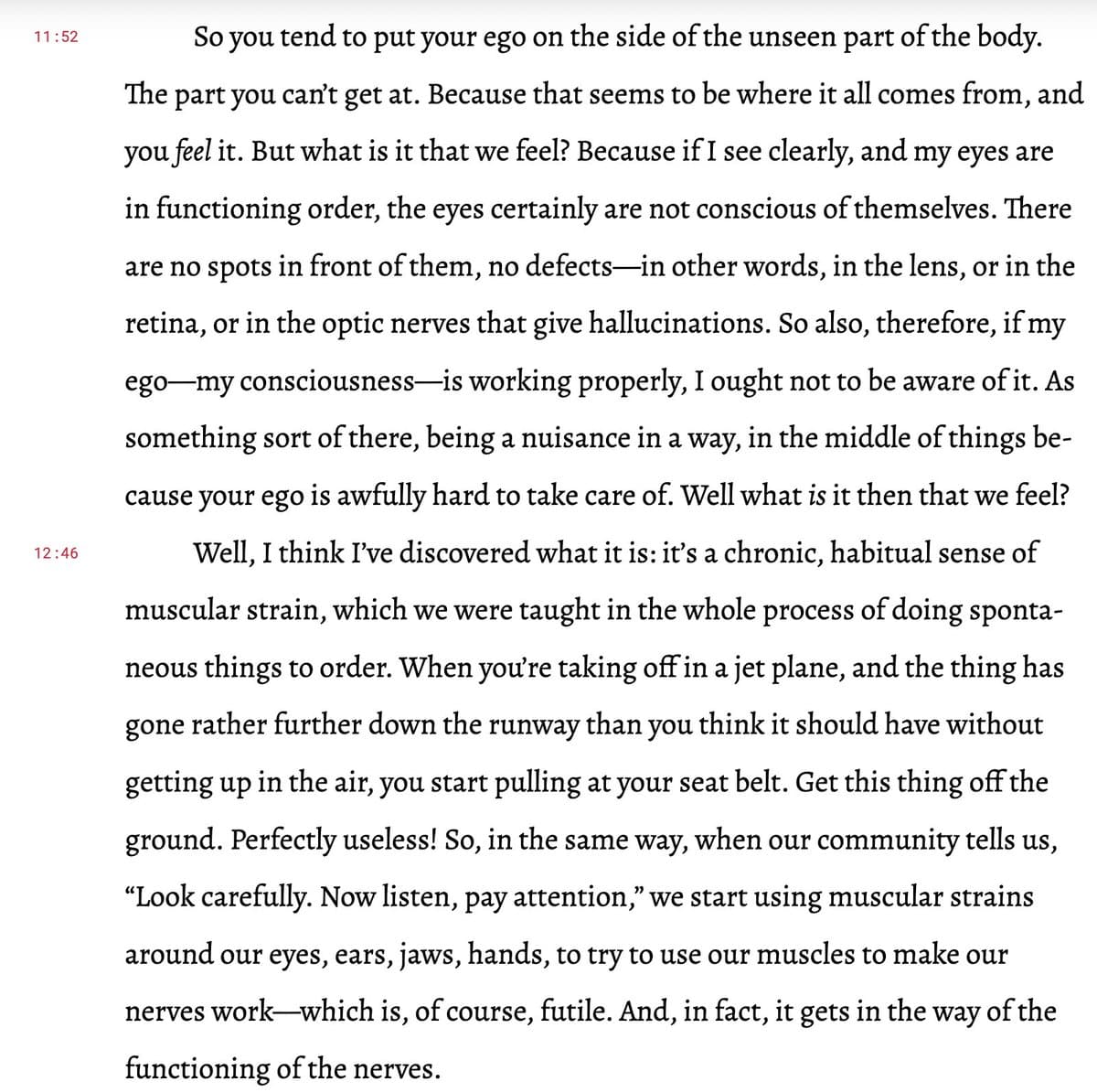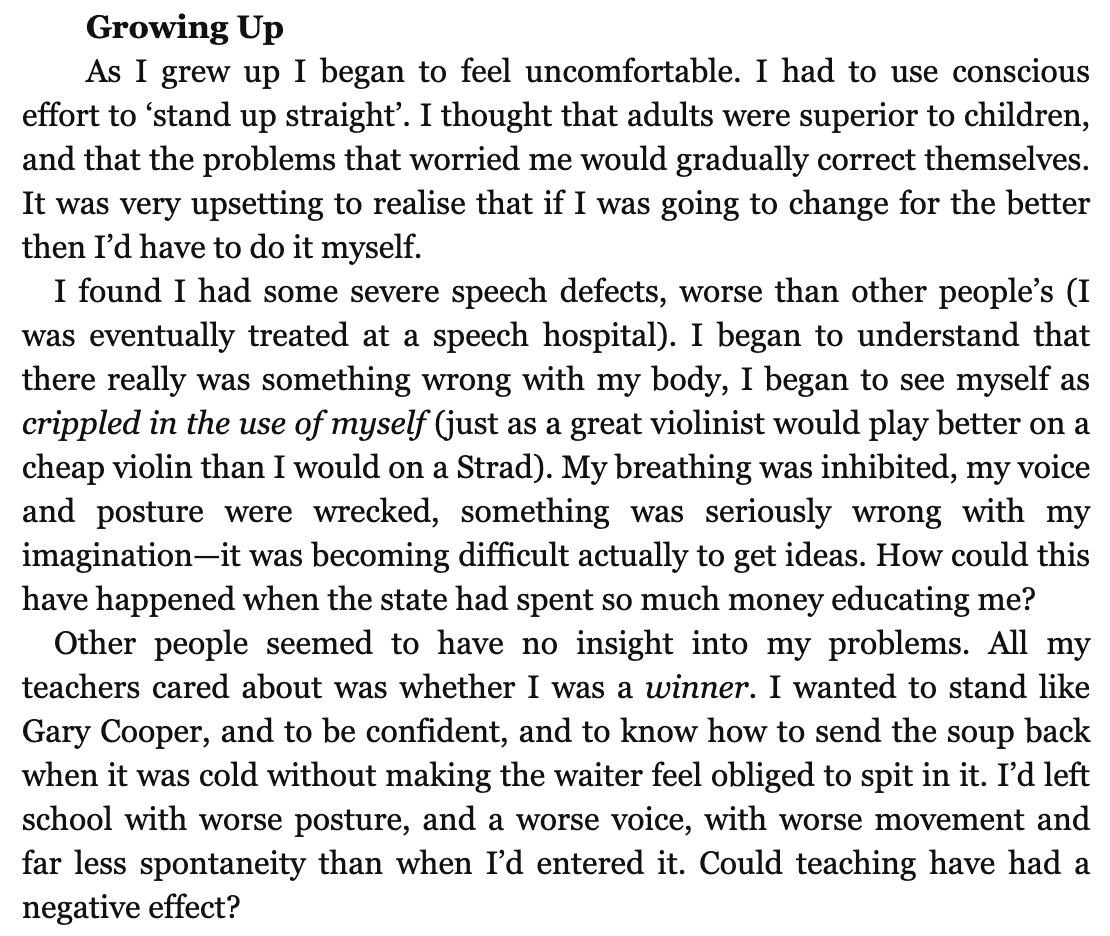🧵 View Thread
🧵 Thread (27 tweets)

1/ The story of how F.M. Alexander discovered the principles named after him give a good introduction into what Alexander Technique is all about. This thread starts with biography and ends with the transcendence of the Self. I hope it's illuminating. Do ask me questions!

4/ This led him to the conclusion that there was something context-specific about speaking on stage that was linked to him losing his voice. He figured there was something that he was doing differently on stage that was causing his vocal problems.

5/ Intrigued, he set up a system of mirrors at home that would allow him to observe himself from multiple angles while speaking. By doing this he noticed that when he went into 'Shakespearean orator mode' he pulled his head back and down, straining his larynx.

6/ The clearly wrong behaviour even felt right to him. Here's the important part: when he tried to *stop* doing this, he found that he couldn't. Try as he might, whenever he started speaking as if on stage, his pattern of habits would kick in, outside of his conscious control.

7/ This observation is what put him on his course to develop Alexander Technique – an educational process that brings the cessation of such automatic habits into conscious control. In the world of AT this is called 'inhibition', which pre-dates Freud's use of the word.

8/ “Between stimulus and response there is a space. In that space is our power to choose our response. In our response lies our growth and our freedom.” – Viktor Frankl Inhibition, then, is the skill to widen the space between stimulus and response – a path to freedom.

9/ Freedom from what? From unhelpful and oftentimes damaging habitual patterns of being that have built up over the course of your life – through no fault of your own besides a lack of awareness of this process happening. Such as?

10/ Two examples. One – You're a child at school. A teacher yells at you to 'pay attention'. What do you do? You respond with muscles. You furrow your brow, you sit up more straight. You're anxious so your breathing becomes shallow. What do muscles have to do with attention?

11/ Two. – It's your early teens and the idea of 'cool' enters your mind. You want to look cool, perhaps a cool walk? How does a cool person walk? Your conscious mind intervenes in your walking. 'You' start 'doing' walking, where before it was natural. A new habit is formed.

12/ Over time we forget we've done this: we confuse the finger that points at the moon for the moon itself. Try concentrating really hard without tightening any muscles in your face, particularly around your eyes, or without breathing any differently. Isn't it difficult?

14/ But there's another way: to stop all that and get out of your own way. Your system knows how to walk, sit, stand, talk and breathe without 'you' getting involved. "If you stop doing the wrong thing the right thing does itself" – F.M. Alexander

15/ This can feel...strange. You catch a ball flawlessly, elegantly and with no effort, but it's like you watch it happen. You set an intention to catch the ball and your hand and arm just reach out, perfectly. When we enter such a state naturally we call it "beginners' luck".

16/ For those familiar with Taoism, such spontaneous action may sound familiar as wu wei. Alexander Technique, then, is a 'western' framework in which to explore and cultivate non-doing. That's my belief anyway. https://t.co/OEfbAnXltk

Alexander Technique is not about posture. Alexander Technique is not about posture. Call it wu-wei. Call it non-doing. Call it cultivating spontaneity. It's about learning how to unlearn and then to explore the space you discover beyond that unlearning.

17/ There's a particular state of consciousness that comes about through practice of Alexander Technique – a kind of very pleasant, wide open three dimensional spatial awareness. We use similar language to that used in Zen. The barriers between Self and the world break down.

18/ I have a theory here inspired by Alan Watts. "It's a chronic habitual sense of muscular strain which we were taught in the whole process of doing spontaneous things to order." [6:30] The video is worth listening to in full. Alan gets it. https://t.co/7FrKx3a6g3

19/ The effect of Alexander Technique is to undo all of that. As we loosen the grip of the chronic muscular pushes and pulls of "I', we in turn loosen the grip of the "I" itself. This is why I think AT is so profound and why I'm keen to share this perspective on it.

@m_ashcroft Ooh @Malcolm_Ocean - check this out! Sounds like a lot of fascinating potential connections to Iain McGilchrist's hemisphere research, sort of a "walking on the right side of the brain" parallel to the book "Drawing on the Right Side of the Brain"

Meta] If you've come across this thread in isolation and want to go deeper then you might be interested in my 'thread of threads' on the topic. https://t.co/pppidMHSzH

Meta] Also, if you want to dive much deeper into this stuff, I have built what I believe is the only asynchronous online course that explores Alexander Technique from a first principles perspective. You can find out more and stay up to date by going here: https://t.co/GHzsyr4ILq

found another reference to this lecture, since this youtube link is broken: https://t.co/b9RuZNJu7m https://t.co/CTjQLKHSCe https://t.co/vSQvzVamBB


18/ I have a theory here inspired by Alan Watts. "It's a chronic habitual sense of muscular strain which we were taught in the whole process of doing spontaneous things to order." [6:30] The video is worth listening to in full. Alan gets it. https://t.co/7FrKx3a6g3

@zachphillips found another lecture where Alan says similar things! Shame that this one got taken down https://t.co/N2vE3VxSsT

Relevant excerpt from Impro https://t.co/fZ1W0sMHQH


Relevant passage from Impro about kids screwing up their faces to show that they're 'trying'. How many of us still do something like this? All of us, if we haven't learned how to stop. And we don't even realise it any more. https://t.co/xrOjWOh3ve
